One-act plays offer intense storytelling and memorable moments in a shorter, more manageable format, making them ideal for both theatre aficionados and newcomers. Take a look through our list to discover something new to inspire and delight actors and audiences alike.
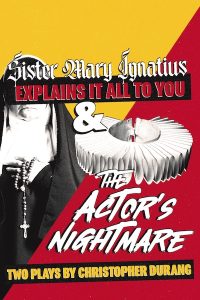 The Actor’s Nightmare by Christopher Durang
The Actor’s Nightmare by Christopher Durang
Having casually wandered onstage, George is informed that one of the actors, Eddie, has been in an auto accident and he must replace him immediately. Apparently no one is sure of what play is being performed but George (costumed as Hamlet) seems to find himself in the middle of a scene from Private Lives, surrounded by such luminaries as Sarah Siddons, Dame Ellen Terry and Henry Irving. As he fumbles through one missed cue after another the other actors shift to Hamlet, then a play by Samuel Beckett, and then a climactic scene from what might well be A Man for All Seasons—by which time the disconcerted George has lost all sense of contact with his fellow performers. Yet, in the closing moments of the play, he rises to the occasion and finally says the right lines, whereupon make-believe suddenly gives way to reality as the executioner’s axe (meant for Sir Thomas Moore) instead sends poor George to oblivion—denying him a well-earned curtain call.
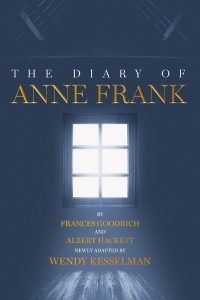 The Diary of Anne Frank (One Act) by Wendy Kesselman from her original adaptation
The Diary of Anne Frank (One Act) by Wendy Kesselman from her original adaptation
In this one act version of Wendy Kesselman’s transcendently powerful adaptation, Anne Frank emerges from history a living, lyrical, intensely gifted young girl, who confronts her rapidly changing life and the increasing horror of her time with astonishing honesty, wit, and determination. An impassioned drama about the lives of eight people hiding from the Nazis in a concealed storage attic, The Diary of Anne Frank captures the claustrophobic realities of their daily existence—their fear, their hope, their laughter, their grief. Each day of these two dark years, Anne’s voice shines through: “When I write I shake off all my cares. But I want to achieve more than that. I want to be useful and bring enjoyment to all people, even those I’ve never met. I want to go on living even after my death!”
 The Candidate by Brent Holland
The Candidate by Brent Holland
Four people wake up in a room with no memory of who they are or how they got there—and no way out. As they’re put through a series of increasingly dangerous trials, they start to realize they’re actually part of a secret interview process.
 Lockdown by Douglas Craven
Lockdown by Douglas Craven
In a dark classroom, eight students sit in an “official lockdown,” not knowing if it’s just a drill or an actual emergency. When a hysterical younger girl bolts from the room and the teacher follows, the remaining students are left alone to decide if it’s safer to stay or run.
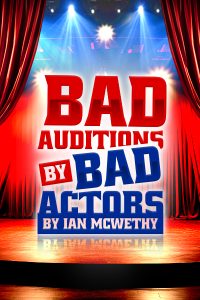 Bad Auditions by Bad Actors by Ian McWethy
Bad Auditions by Bad Actors by Ian McWethy
A casting director has one day to find the leads for a community theater production of Romeo and Juliet. But what seems like a simple task proves impossible when the pool of actors includes extreme method actors, performers who just don’t know what to do with their hands, and one particular woman who may or may not think she’s a cat. This hilarious comedy will bring you to the last place you’d ever want to be: behind the doors of a casting session. (A full-length version of this play is also available.)
 Selfie by Bradley Hayward
Selfie by Bradley Hayward
It’s senior year and problems are mounting for a group of high school students as they prepare for the future. Facing bullies, parents, pressure, sickness, and their own self-judgment, the characters search for ways to stand out. As they document their year, one click at a time, they come to realize life is not about what other people see—it’s about the pictures they have of themselves.
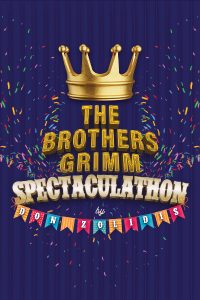 The Brothers Grimm Spectaculathon by Don Zolidis
The Brothers Grimm Spectaculathon by Don Zolidis
Two narrators attempt to recreate all 209 of the fairy tales of the Brothers Grimm in a wild, fast-paced extravaganza. To make it more difficult, they attempt to combine them into one gigantic fable using Rapunzel, Rumpelstiltskin, Hansel and Gretel, Snow White, Sleeping Beauty, Cinderella and other more obscure stories like Lean Lisa and The Devil’s Grandmother. (A full-length version of this play is also available.)
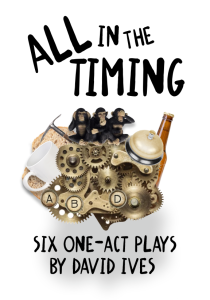 All in the Timing, Six One-Act Plays by David Ives
All in the Timing, Six One-Act Plays by David Ives
This critically acclaimed, award-winning evening of comedies combines wit, intellect, satire, and just plain fun. A hilarious sextet whether played together or separately including the ever-popular Sure Thing; Words, Words, Words; The Universal Language; Philip Glass Buys a Loaf of Bread; The Philadelphia; Variations on the Death of Trotsky.
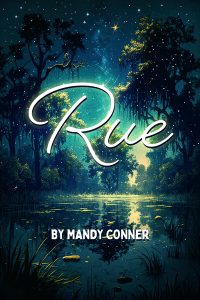 Rue by Mandy Conner
Rue by Mandy Conner
Deep in a Louisiana swamp, sixteen-year-old Josephine struggles with intense anxiety following the mysterious disappearance of her parents. She refuses to leave the safety of her home and face the outside world, even as it becomes increasingly dangerous for her to stay in the marshland. Against the wishes of her brother and best friend, Jo turns to the dark inhabitants of the swamp for answers. But is she brave enough to face the truth about her family—and herself?
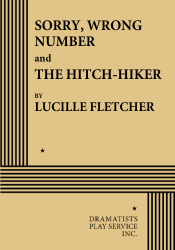 Sorry, Wrong Number by Lucille Fletcher
Sorry, Wrong Number by Lucille Fletcher
A mystery thriller, the tale of a neurotic invalid, whose only contact with the outside world is her phone. Over this, one night, because of a crossed wire, she hears plans for a murder, which turns out to be her own. Her frantic efforts to enlist help through the only means at her disposal, her growing terror and realization of the truth, and (along the way) the hints about her own life and personality she lets drop, make this a full character portrait not only of herself but of the unseen murderer, whose identity and motivations are surmised but never revealed. A tour de force of acting for the female star, who commands the stage throughout, this play also picks up through the many phone calls, and personality vignettes of the outside world, including gangsters, phone operators, a police sergeant, etc., each of which is distinct and of vital importance to the storyline. The play has been adapted by the author for an easy stage presentation, which should be as telling as the original radio version; although both have been made available in this present printing.
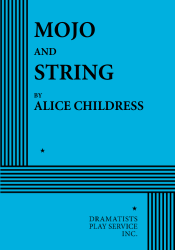 Mojo by Alice Childress
Mojo by Alice Childress
Subtitled A Black Love Story, this affecting and revealing play captures the essence of the black experience in the outspoken confrontation between a man and a woman once married and still deeply committed to each other. Paying a surprise visit to her former husband, Irene, ill with cancer, reveals that she must shortly go back into the hospital but wants to see Teddy just once more. From their conversation it is evident that a warm bond still exists between the two, and over the course of their visit they rehash their lives together in humorous and sometimes achingly sad detail.
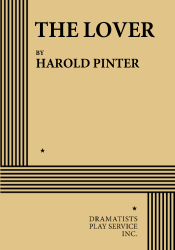 The Lover by Harold Pinter
The Lover by Harold Pinter
“A husband goes to his office politely asking if his wife’s lover will be coming today. She murmurs ‘Mmmm,’ and suggests he not return before six. In order not to return before six he will no doubt visit a prostitute. A competition is glossily established. When the lover does come, he is the husband, which is not surprising. The kind of sex-play follows that suggests this is the necessary titillation, and the necessary release of hostility, between a man who means to be master of the house and a wife who means to be both wife and mistress, whatever the house may be. But there is a flaw in the accommodation. The lover is weary of his mistress; she is no longer particularly appetizing. By the time he returns, as husband, in the evening, his wife is still disturbed by the news. The performance of the afternoon has begun to carry over into the reality (or pretense) of the evening. Suddenly the husband is not quite husband, diffident over his drink. He is blurring into the lover, at the wrong hour, and angrily. The wife must seduce him now as wife, not as mistress. She does.” —New York Herald-Tribune.





